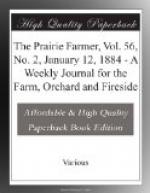Prof. Wiley has made experimentally some fair samples of rum and alcohol from sorghum molasses. Under favorable circumstances one gallon of molasses weighing eleven pounds would give 2.75 pounds absolute alcohol, 3.03 pounds of 90 per cent, and 5.5 whisky or rum. Thus each gallon of molasses would give nearly half a gallon of commercial alcohol and two thirds of a gallon of whisky or rum. As it has been abundantly proved, he says, that sugar can be made from sorghum, the Government should make no further experiments in this direction. Prof. Wiley has tried the diffusion process, and finds it yields 20 per cent more sugar, but at a somewhat higher cost than grinding. The Government, he thinks, should purchase machinery for large experiments in the diffusion process, and should raise its cane somewhere else than near Washington, as land there is expensive and not adapted to the purpose. The Government should also make arrangements with agricultural colleges or other agencies in various States for experimenting with sorghum-culture to determine what parts of the country are most favorable to the culture of sugar-producing plants. Prof. Wiley suggests in each State the trial of two acres divided into ten plots—five for sorghum, four for beets, and one for corn—to test for purposes of comparison the general fertility of the soil and the character of the season. The Government ought to carry on for a series of years the process of selection of sorghum seed in order to secure an improvement in the quality of the cane.
THE COLD SPELL.
The cold weather of last week seems to have extended over nearly the entire North American Continent. Nothing for severity has been known to equal it during a long series of years. East, West, North, and South it was all the same, differing in degree of course, but uniformly colder than scarce ever known in the same latitude.
The greatest loss to stock so far as heard from was in that in transit to market. On some of the roads the losses were heavy. A dispatch from Independence, Mo., says a train of fifteen cars, loaded with mules from Texas via the Iron Mountain and Southern road, arrived there on the 5th, when it was discovered that at least 100 of the mules had frozen to death, and the others were in a freezing condition. The mules were two years old and direct from grass. They had been three days without food.
Many trains arriving at Chicago had scores of frozen animals.
No great disaster is yet reported from the far West or from Minnesota and Dakota. Still there must have been great suffering not only among the dumb brutes, but among human beings as well. It is fortunate that polar waves do not visit us more frequently.
The effect upon fruit, buds, trees, and shrubs is not yet ascertained. It will be a marvel if many localities are not barren of fruit of nearly all kinds next year.




